Harvey Mudd Goldwater Scholars
The Barry Goldwater Scholarship and Excellence in Education Foundation was established by Congress in 1986 to serve as a living memorial to honor the lifetime work of Senator Barry Goldwater, who served his country for 56 years as a soldier and statesman, including 30 years in the U.S. Senate.
By providing scholarships to college sophomores and juniors who intend to pursue research careers in the natural sciences, mathematics and engineering, the Goldwater Foundation is helping ensure that the U.S. is producing the number of highly-qualified professionals the Nation needs in these critical fields. Over its 30-year history, Goldwater Scholarships have been awarded to thousands of undergraduates, many of whom have gone on to win other prestigious awards like the National Science Foundation’s Graduate Fellowship, Rhodes Scholarship, Churchill Scholarship and the National Defense Science and Engineering Graduate Fellowship that support our Scholars’ graduate school work. Today, Goldwater alumni can be found conducting research that is helping defend the Nation, finding cures for catastrophic diseases and teaching future generations of scientists, mathematicians and engineers.
Sydney Porto ’24 (chemistry and biology), awarded in 2023
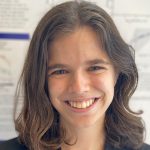
Sydney Porto ’24, an aspiring physician-scientist at Harvey Mudd College, is the recipient of a Barry Goldwater Scholarship, the most prestigious national award for undergraduate STEM researchers. The award for undergraduate U.S. sophomores and juniors covers the cost of tuition, fees, books, and room and board up to $7,500 per year.
Since summer 2022, Porto has worked in the lab of Michael J. Lee in the Department of Systems Biology at the University of Massachusetts Chan Medical School. “My project is focused on understanding mechanisms of lethality in non-small cell lung cancer cells following the application of growth factor targeted therapies,” she says. She will continue work in the Lee Lab this summer.
Porto, a chemistry and biology major with a classics concentration, also conducted research at Harvey Mudd during her sophomore year in the Schulz Lab. Danae Schulz, associate professor of biology, studies the African trypanosome to understand the changes that occur when the parasites go from expressing the variable protein in mammals to the invariant protein in flies. With Hannah Betts ’23, Porto tested an endogenous overexpression method that could potentially be used in future genetic screens.
Schulz says, “I’ve known Sydney since she was a first-year student at Harvey Mudd, and I was immediately impressed with her intellect, drive and dedication. She is a delight to work with in the lab; she’s curious and purposeful while performing experiments, and she is able to work through technical difficulties without becoming discouraged. This resilience is essential for someone taking on the difficult career path she aspires to.”
In addition to her time in the lab, Porto works at the Harvey Mudd Writing Center as an Academic Excellence biology tutor. After HMC, she plans to pursue an M.D./PhD in the field of cancer biology. “Ultimately, I hope to have a career as a physician-scientist where I can conduct clinically relevant research in the field of oncology,” she says.
Albany Blackburn ’23 (physics), awarded in 2022
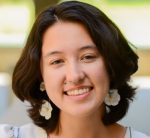
Albany Blackburn ’23, a Harvey Mudd College physics major, is the recipient of a Barry Goldwater Scholarship, the most prestigious national award for undergraduate STEM researchers. The award for undergraduate U.S. sophomores and juniors covers the cost of tuition, fees, books, and room and board up to $7,500 per year. This year, 417 scholarships were awarded from a candidate pool of 5,000 U.S. sophomores and juniors.
Nominated by faculty mentors, Blackburn is interested in pursuing a career in academia, teaching physics and doing research at the university level. She is doing research with physics professor Brian Shuve to demonstrate that their proposed search method has high potential to find dark matter particles in particle collider experiments. “Our method involves reconstructing the decays of long-lived particles, which gives us high sensitivity to a wide range of possible dark matter models,” says Blackburn.
She has also conducted research with HMC engineering professor Leah Mendelson and Texas A&M University professor Jeremy Holt. With Mendelson, she wrote code to calibrate a camera array used for particle image velocimetry. With Holt, she used machine learning techniques to calculate the nuclear equations of state for neutron stars.
Outside of academics, Blackburn is a residential life mentor, works as an Academic Excellence physics tutor and helps plan student activities as a member of the Division of Student Affairs Muchachos.
After graduating, she plans to attend graduate school to earn a PhD in particle physics.
Tonatiuh Gonzalez ’22 (mathematics and biology), awarded in 2021
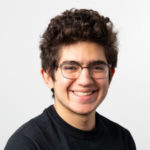
Tonatiuh Gonzalez ’22, a math and computational biology major, is doing research with Eliot Bush, who studies microbial genome evolution. “Our research is about reconstructing the evolutionary history of bacteria and identifying events that may have given bacteria environmental or antibacterial resistance or increased virulence,” says Gonzalez, who intends to pursue either an M.D. or PhD in computational biology and conduct research in disease genomics. His career interests include cancer research and practicing medicine. In 2020, Gonzalez was named an HMC Outstanding Emerging Leader for demonstrating collaboration, integrity, respect and support.
Jacob Kelber ’23 (chemistry), awarded in 2021
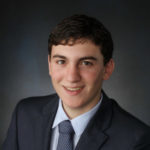
Jacob Kelber ’23, a chemistry major, worked during summer 2020 with Katherine Van Heuvelen to develop new, environmentally friendly catalysts for important reactions. “The goal of my research was to computationally screen a catalyst for the detoxification of potentially carcinogenic industrial pollutants perchloroethylene and trichloroethylene,” says Kelber, who also worked with chemistry professors Hal Van Ryswyk (HMC) and Nathan C. Gianneschi (Northwestern). “I was able to successfully find an iron-based catalyst and model its reaction with PCE and TCE.” With a goal of teaching at the university level, Kelber intends to pursue a PhD in chemistry and continue research in chemical science. “I would like to focus this research on finding ways to capture carbon dioxide and other greenhouse gases in the atmosphere and/or finding a sustainable method to deal with our plastic waste.”
Hanna Porter ’22 (chemistry), awarded in 2021
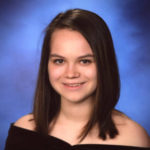
Hanna Porter ’22, a chemistry major, is working in both Hal Van Ryswyk’s chemistry lab and Tom Donnelly’s physics research group. “I have been involved in research involving quantum dot size determination via pulsed-field gradient NMR in Professor Van Ryswyk’s lab and developing an RF-plasma reactor for gas-phase graphene synthesis in Professor Donnelly’s lab,” says Porter, who was awarded HMC’s Platt Prize for her academic accomplishments and contributions to the life of the College. This summer, she will investigate electron microscopy during a National Science Foundation research opportunity at Cornell University called PARADIM (Platform for the Accelerated Realization, Analysis, and Discovery of Interface Materials), which is dedicated to the discovery and fabrication of materials with unprecedented properties that do not exist in nature. Upon graduation, Porter plans to obtain a PhD in physical chemistry or materials science. She is interested in conducting materials science research to investigate energy storage solutions and novel renewable energy sources to combat climate change.
Anna Soper ’22, (physics and mathematics), awarded in 2021
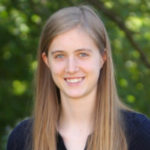
Anna Soper ’22, physics and math major and a member of Lori Bassman’s research team, is studying metal alloys and working on computationally simulating their compositions and structures. “My current research is in the field of computational materials science, where I am investigating the chemical and structural mechanisms by which the brittle sigma phase in a novel stainless steel substitute is destabilized by the addition of aluminum, producing a useful, ductile alloy,” Soper says. In collaboration with Bassman, physics professor Nicholas Breznay and Jonas Kaufman ’17, she has developed a model of the complex sigma phase that predicts the lattice sites that different atomic species preferentially occupy, allowing researchers to study local changes in bond lengths and charge distributions that may contribute to the destabilization of the sigma phase. This summer, Soper will do research in nonlinear photonics and optical computing at Caltech before applying to graduate school, where she’ll pursue a PhD in experimental atomic, molecular and optical physics.
The Goldwater Scholarships are the result of a partnership with the Department of Defense National Defense Education Programs and the Barry Goldwater Scholarship and Excellence in Education Foundation. The scholarship program honoring Senator Barry Goldwater was designed to foster and encourage outstanding students to pursue careers in the fields of mathematics, the natural sciences and engineering. All Harvey Mudd sophomores and juniors are eligible to compete for the Goldwater Scholarship.
Aria Beaupre ’21 (mathematics), awarded in 2020
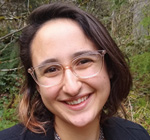
Aria Beaupre ’21, a Harvey Mudd College mathematics major known for making math joyful, accessible and inspiring on campus and beyond, is the recipient of a Barry Goldwater Scholarship, the most prestigious national award for undergraduate STEM researchers. The award for undergraduate U.S. sophomores and juniors covers the cost of tuition, fees, books, and room and board up to $7,500 per year. This year, 396 scholarships were awarded to college students across the United States.
Beaupre has taken advantage of the College’s many research opportunities since her first year on campus. During her first year, she worked with Rachel Levy, former HMC professor of mathematics, on mathematics education research focused on integrating mathematical modeling into elementary school mathematics curriculum. Beaupre worked with Michael Orrison, professor of mathematics, on voting theory research—the mathematics behind elections. They worked on creating new voting procedures and analyzing their properties and relationships to other voting procedures. During summer 2019, Beaupre participated in a Research Experience for Undergraduates (REU) with David Milan, associate professor of mathematics at the University of Texas at Tyler. They studied semigroups and worked on a general characterization for the inverse hull of a Markov subshift.
Last year, the Department of Mathematics selected Beaupre to receive the Alvin White Prize, which is given to those who have contributed to the humanistic side of the mathematics community, both on campus and beyond. The citation notes more of Beaupre’s accomplishments:
“… Aria completed a book on math modeling for principals. She and Athena Li ’21 also wrote an article for the MAA newsletter describing their experience attending a national math conference and encouraging undergraduates to attend. In 2018, she was hired to build community in the new HMC REU. Her work was especially important for students attending from other schools who did not already have friends on campus. She also has been communicative about her love of mathematics through several efforts, including the great fractal photos on display in the Borrelli Lounge …”
Beaupre is a math tutor in the College’s Academic Excellence Program and a grader and tutor for Abstract Algebra.
“This scholarship was achieved with the help of so many people,” says Beaupre, who plans to attend graduate school for theoretical mathematics. Her goal is to become a mathematics professor. “I am very grateful to my research advisors and the professors here at Mudd, for giving me countless opportunities to learn and grow as a mathematician. I am also grateful to all the teachers in the Eatonville School District who ignited my love for academics.”
From an estimated pool of over 5,000 college sophomores and juniors, 1,343 natural science, engineering and mathematics students were nominated by 461 academic institutions to compete for the 2020 Goldwater scholarships. Of students who reported, 191 of the Scholars are men, 203 are women, and virtually all intend to obtain a PhD as their highest degree objective. Fifty Scholars are mathematics and computer science majors, 287 are majoring in the natural sciences, and 59 are majoring in engineering. Many of the Scholars have published their research in leading journals and have presented their work at professional society conferences.
The Goldwater Scholarships are the result of a partnership with the Department of Defense National Defense Education Programs (NDEP) and the Barry Goldwater Scholarship and Excellence in Education Foundation. With the 2020 awards, this brings the number of scholarships awarded since 1989 by the Goldwater Foundation to 9047 and a scholarship total to over $71 million.
The scholarship program honoring Senator Barry Goldwater was designed to foster and encourage outstanding students to pursue careers in the fields of mathematics, the natural sciences and engineering. All Harvey Mudd sophomores and juniors are eligible to compete for the Goldwater Scholarship, which is awarded on the basis of academic merit. The HMC Department Chairs Committee nominates up to four students annually.
Havi Ellers ’20 (mathematics), awarded in 2019
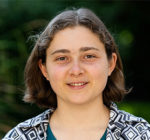
Havi Ellers, a junior majoring in mathematics at Harvey Mudd College, is the recipient of a Barry Goldwater Scholarship, the most prestigious national award for undergraduate STEM researchers. The award for undergraduate U.S. sophomores and juniors covers the cost of tuition, fees, books, and room and board up to $7,500 per year. This year, 496 scholarships were awarded to college students across the United States.
Ellers was a Goldwater Scholarship Honorable Mention recipient last year. Over the summer of 2018, she did research in number theory (bounding the traces of Maass-Poincaré series) at a National Science Foundation Research Experience for Undergraduates at Texas A&M University. There, she worked with one other undergraduate and faculty mentor/associate professor Riad Masri.
During summer 2017, she participated in the WADE Into Research program for undergraduates at Wake Forest University. There, she worked with three other undergraduates and faculty adviser Katherine Thompson (now at Carnegie Mellon University) to study mathematical objects called quadratic forms. Ellers says she plans to pursue a PhD in pure mathematics—“that will hopefully make the world a better place”—then become a math professor and researcher at a university.
“I am honored to have been awarded the Goldwater scholarship, and am grateful to everyone who has helped and encouraged me in my pursuit of mathematics,” says Ellers, a former competitive gymnast who started a gymnastics club at Harvey Mudd, plays piano and is fluent in casual Japanese. “In a practical sense, the scholarship will help me to pay for my last year of school, and also the process of writing the application has given me the invaluable opportunity to organize my thoughts with respect to math.”
From an estimated pool of over 5,000 college sophomores and juniors, 1,223 natural science, engineering and mathematics students were nominated by 443 academic institutions to compete for the 2019 Goldwater scholarships. Of students who reported, 241 of the Scholars are men, 252 are women, and virtually all intend to obtain a PhD as their highest degree objective. Sixty-two Scholars are mathematics and computer science majors, 360 are majoring in the natural sciences, and 74 are majoring in engineering. Many of the Scholars have published their research in leading journals and have presented their work at professional society conferences.
As the result of a partnership with the Department of Defense National Defense Education Programs (NDEP), the Barry Goldwater Scholarship and Excellence in Education Foundation announced that its trustees more than doubled the number of Goldwater scholarships awarded for the 2019–2020 academic year. “As it is vitally important that the nation ensures that it has the scientific talent it needs to maintain its global competitiveness and security, we saw partnering with the Goldwater Foundation as a way to help ensure the U.S. is developing this talent,” said Jagadeesh Pamulapati, director of the NDEP program, about the new partnership. With the 2019 awards, this brings the number of scholarships awarded since 1989 by the Goldwater Foundation to 8,628 and a scholarship total to over $68 million.
The scholarship program honoring Senator Barry Goldwater was designed to foster and encourage outstanding students to pursue careers in the fields of mathematics, the natural sciences and engineering. All Harvey Mudd sophomores and juniors are eligible to compete for the Goldwater Scholarship, which is awarded on the basis of academic merit. The HMC Department Chairs Committee nominates up to four students annually.
Leah Stevenson ’19 (chemistry), awarded in 2018
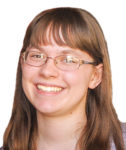
Leah Stevenson ’19, an aspiring chemist at Harvey Mudd College, is the recipient of a Barry Goldwater Scholarship, the most prestigious national award for undergraduate STEM researchers. The award for undergraduate U.S. sophomores and juniors covers the cost of tuition, fees, books, and room and board up to $7,500 per year. This year, 211 scholarships were awarded and 281 nominees were named as Honorable Mentions, including Havi Ellers ’20.
Stevenson is both an active researcher and leader at Harvey Mudd. She is a chemistry tutor for Academic Excellence, a musician in The Claremont Colleges Orchestra and is part of The Claremont Colleges Library Board of Student Stakeholders. She’s also a recipient of the Department of Chemistry’s William G. Sly Prize, which recognizes her curiosity, intellectual integrity and enthusiasm for chemistry.
This year, Stevenson received the National Institute of Standards and Technology’s Summer Undergraduate Research Fellowship granting her the opportunity to explore the development of novel alternative fuels with Thomas J. Bruno, group leader of the Experimental Properties of Fluids Group of the Applied Chemicals and Materials Division. She will study the phase properties of biofuels via NIST’s composition-explicit distillation curve, a technique that provides an energy content channel in addition to the volatility of a fuel. Stevenson will have the opportunity to become an expert at gas chromatography, mass spectrometry and many other analytical techniques.
During summer 2017, Stevenson worked with Dr. John Cort at Pacific Northwest National Laboratory to improve the characterization of complex bio-oil mixtures using heteronuclear NMR spectroscopy.
“The conversion of biomass into liquid fuels is of interest as a source of sustainable energy, and it is important to understand the chemical composition of these mixtures and the effects of their composition on properties relevant to their use as fuels,” says Stevenson. “NMR spectroscopy is a powerful tool for elucidation of the components of bio-oils and their chemical structures. I collected, processed and analyzed HSQC NMR spectra of bio-oils as well as possible components. I developed and implemented an algorithm in Python to match the spectra of the components with features in the bio-oil spectra so that individual molecular components could be distinguished.”
Her research at Harvey Mudd with professors Gerald Van Hecke ’61 and Kerry Karukstis involves studying the self-assembly process of chromonic molecules, a class of soluble aromatic compounds that stack via intermolecular interactions to form column-like aggregates in solution. Stevenson uses static light scattering in conjunction with refractive index measurements and fluorescence spectroscopy to learn more about this stacking process in chromonic systems.
Stevenson says her goal is to obtain a PhD in physical chemistry and pursue a career in basic chemical research.
Daniel Johnson ’18 (computer science and mathematics), awarded in 2017
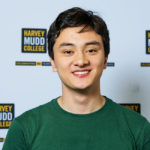
Talk of “robot-proof” careers often focuses on how people can maintain their relevancy in a society that increasingly uses robot labor to replace humans. Where others see an automation apocalypse, Daniel Johnson, a junior at Harvey Mudd College, sees opportunity.
A recipient of the Barry Goldwater Scholarship—the most prestigious national award for undergraduate STEM researchers—Johnson will use artificial intelligence and machine learning to solve complex problems. The award covers the cost of tuition, fees, books, and room and board up to $7,500 per year. Rachael Kretsch ’18 received a Goldwater Honorable Mention.
The 2017 Goldwater Scholars were selected based on academic merit from a field of 1,286 natural sciences, mathematics and engineering students nominated by the campus representatives from among 2,000 colleges and universities nationwide. Of those reporting, 133 of the Scholars are men, 103 are women, and virtually all intend to obtain a PhD as their highest degree objective. Twenty-two Scholars are mathematics majors, 153 are science and related majors, 51 are majoring in engineering and 14 are computer science majors. Many of the Scholars, like Johnson and Kretsch, have dual majors in a variety of STEM fields.
A joint computer science and math major, Johnson is a tutor for the Math Academic Excellence program (which helps students with math Core classes) and also a grutor (grader/tutor) for the computer science course Neural Networks.Johnson conducted research with engineering Professor David Harris and a group of other students on open-core processor design verification and with computer science Professor Robert Keller on designing a neural network-based system to improvise jazz melodies.
Johnson is working on a neural network model he developed that can manipulate graphical states, which he hopes will allow neural networks to reason abstractly about the structures in data. This summer, Johnson has an internship at Cruise Automation in San Francisco and will work on using machine learning techniques to program self-driving cars.
Christopher Hoyt ’18 (mathematics), awarded in 2016
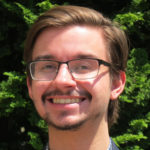
Christopher Hoyt, Math Club treasurer for the HMC chapter of theSociety for Industrial and Applied Mathematics and a grader for the Department of Mathematics, expressed gratitude for guidance received and opportunities made possible by mathematics professors at Harvey Mudd (Francis Su, Talithia Williams and Art Benjamin) and University of Wyoming (Carolyn Rasmussen and Anne Sylvester).
“In past summers, I worked with Dr. Sylvester and Dr. Rasmussen at the University of Wyoming in order to analyze the phenotypes of Maize mutants using various methods of microscopy,” says Hoyt. “The first summer, I found that a particular Maize mutant named Warty2 had direct connections to Maize’s ability to withstand drought stress. The second summer, I conducted research on TANGLED, a mutant that alters the cell division orientation, causing the cells to become disorganized in the leaves of mature plants. Last year, I worked with Dr. Rasmussen again at the University of California at Riverside in order to develop a computational method of taking images of cells and producing an approximation of where the future division sites will occur.”
This summer, Hoyt will conduct research at the National Institute of Standards and Technology (NIST) 2016 Summer Undergraduate Research Fellowship program in Boulder, Colorado. During this prestigious 11-week program, Hoyt will work with Jeanne Quimby and the Metrology Wireless Group conducting measurements of wireless propagation channels using NIST’s robotic system in order to develop standards for the next generation of wireless cellular communications systems.
Jonas Kaufman ’17 (physics), awarded in 2016
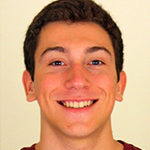
A member of engineering Professor Lori Bassman’s research team, physics major Jonas Kaufman is helping develop novel high entropy alloys, a family of metallic alloys that have the potential to replace many traditional alloys due to vastly superior properties that can be tailored to specific applications. His focus is on modeling mechanical properties of these alloys through ab initio atomistic simulation.
“I have been developing techniques to calculate generalized stacking fault energies of complex alloys, which can be used to predict and understand their deformation behavior,” says Kaufman. “We have an ongoing research collaboration with School of Materials Science and Engineering at the University of New South Wales in Sydney, Australia. I spent last summer there doing computation and will be returning this summer to conduct experimental work.”
Kaufman, who is active on campus as a dorm president and a facilitator for Academic Excellence, looks forward to conducting computational and experimental materials research and teaching at the university level after earning a PhD in materials science and engineering.
Dina Sinclair ’17 (mathematics), awarded in 2016
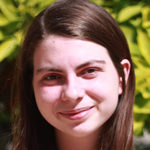
Mathematics major Dina Sinclair has worked for the past two years with mathematics Professor Rachel Levy doing computational fluid dynamics. Their research looked at ways in which lung surfactants are modeled so that doctors can better understand how to medicate premature babies whose lungs are surfactant deficient.
Sinclair, a facilitator for Academic Excellence, Office of Admission tour guide and dorm mentor, will present her work at the Society for Industrial and Applied Mathematics Annual Meeting in Boston this summer.
For the Goldwater, she wrote a proposal that looks at using linear programming and differential equations modeling to optimize water and sanitation aid distribution in small non-constant populations, such as refugee camps.
“I’m really grateful to Prof Levy and others who’ve guided me through the research process and inspired me to keep looking for ways to use mathematical modeling to improve the world we live in,” says Sinclair, who is living with a host family and studying computer science and sociology at the Universidad Carlos III in Madrid during the 2016 spring semester.
The scholarship program honoring Senator Barry Goldwater was designed to foster and encourage outstanding students to pursue careers in the fields of mathematics, the natural sciences and engineering. All Harvey Mudd sophomores and juniors are eligible to compete for the Goldwater Scholarship, which is awarded on the basis of academic merit. The Department Chairs Committee nominates up to four students annually.
Timothy Middlemas ’17 (physics), awarded in 2015
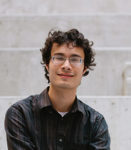
The most prestigious national award for undergraduate STEM researchers has been awarded to Harvey Mudd College sophomore Timothy Middlemas.
Middlemas, a physics major, received a 2015 Goldwater Scholarship, which covers the cost of tuition, fees, books, and room and board up to $7,500 per year. He performed cross-disciplinary research with Professor of Chemistry Robert Cave, investigating multi-state effects in chemical reactions. In many chemical processes, so-called “non-adiabaticity” effects are the essence of the electron transfer (ET) problem, determining their distance- and orientation-dependencies.They all use some approximation to calculate the electronic coupling element, and are typically difficult to calculate accurately. Approximation methods are ubiquitous, but formal tests of their accuracy are difficult to come by.Middlemas worked on a one-dimensional, two-site model for which exact wavefunctions can be calculated—namely the two delta function potential.
“Tim’s model, though simple, offers the possibility of a rigorous test of approximate methods for the calculation of the electronic coupling because exact wavefunctions can be obtained and their nuclear derivatives calculated (numerically),” says Cave. “That Tim made this kind of progress in one summer and has obtained a working code that will answer important questions in electron transfer is singular in my experience. He has a passion for doing science and doing it well, and is an exemplary recipient of this award.”
Middlemas plans to pursue a PhD in chemical physics and hopes to conduct research in theoretical and computational chemistry and teach at the university level.
The Goldwater Scholars were selected on the basis of academic merit from a field of 1,206mathematics, science and engineering students who were nominated by the faculties of colleges and universities nationwide. One hundred forty-five of the Scholars are men, 115 are women and virtually all intend to obtain a PhD as their degree objective.
Samuel Gutekunst ’14 (mathematics), awarded in 2013
Three Harvey Mudd College juniors have received the most prestigious national award for undergraduate researchers in science, mathematics and engineering.
Samuel Gutekunst ’14, a mathematics major, and Sheena Patel ’14, a physics major, have been awarded Goldwater Scholarships for the 2013-2014 academic year, it was announced by the Barry M. Goldwater Scholarship and Excellence in Education Foundation in March. Andrew Patrick Turner ’14, a mathematics and physics major, received an honorable mention.
All college sophomores and juniors are eligible to compete for the scholarships, which provide a maximum of $7,500 each year for one or two years to cover tuition, fees, books and room and board. Each year, HMC nominates up to four students for the Goldwater Scholarship Program. The Department Chairs Committee serves as the nominating body.
The 271 Goldwater Scholars were selected on the basis of academic merit from a field of 1,107 mathematics, science and engineering students who were nominated by the faculties of colleges and universities nationwide. One hundred seventy-six of the scholars are men, 95 are women and virtually all intend to obtain a PhD as their degree objective.
“The HMC community is delighted that Samuel and Sheena have been named Goldwater Scholars and that Andrew received an honorable mention,” said Jeff Groves, vice president of academic affairs and dean of faculty. “We have a long institutional history with the Goldwater Scholarship Program. In the last 10 years, 16 of our students have been recognized by the program as outstanding young researchers and leaders. Harvey Mudd College is honored to participate.”
Gutekunst has worked with mathematics Professor Michael Orrison and David Lingenbrink ’14 on a research project involving voting theory. “This project, and the exciting voting theory it exposed us to, formed the basis for my personal statement and Goldwater application. HMC Professor Dagan Karp and East Tennessee State University mathematics Professor Anant Godbole have also helped me to develop significantly as a researcher and mathematician. I do not think I would have had any chance at winning this award without the enthusiasm, support and knowledge of these three professors.” Gutekunst has served as an HMC Honor Board representative, tutored students from his hometown via Skype, participated in the Catholic Pastoral Council meetings and was an orientation sponsor for the Class of 2015. He is interested in pursuing a PhD in mathematics and eventually teaching and doing research at the university level.
Sheena Patel ’14 (physics), awarded in 2013
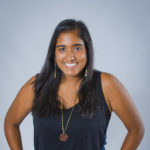
Since her first year, Patel has worked in the magnetism research group with physics professors James Eckert and Patricia Sparks. She presented her research on thin-film multilayers of cobalt and nickel last year at the International Conference on Magnetism in South Korea. “I love the research I do and it is exciting to see that other people think this is meaningful work,” she said. “Professors Eckert and Sparks have given me the opportunity to find a research project that I find really interesting and learn not only about these magnetic materials, but about how to be a research scientist.”
Kevin William O’Neill ’13 (mathematics), awarded in 2012
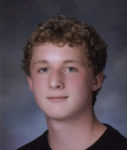
O’Neill, a math major, intends to earn a doctorate in mathematics, potentially focusing on analysis or topology, and eventually teaching at the university level.
Last summer, he worked with math Professor Francis Su and Rosalie Carlson ’13 on a research project where they studied collections of circular arcs and their graphs to solve a problem in voting theory.
“It was a great experience that served as an introduction to how you approach an open problem,” he said. “I’ve taken a lot of good classes, but this project was a highlight.”
This summer, O’Neill will participate in math research at Penn State University. Next year, he will conduct research in algebraic topology with Su and do a thesis on tropical geometry with Dagan Karp, assistant professor of mathematics.
O’Neill is among 282 Goldwater Scholars chosen from a field of 1,123 math, science and engineering students nominated by faculty members at colleges and universities nationwide. Selected based upon merit, this year’s Scholars include 194 students majoring in science and related majors, 58 engineering majors, 20 math majors and 10 computer science majors.One hundred seventy-four of the Scholars are men, 108 are women, and all intend to pursue doctorate degrees.
Lucas Tyler Brady ’13 (physics), awarded in 2012
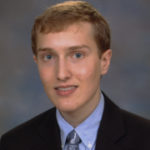
Brady, a physics major, plans to earn a doctorate in theoretical physics and is considering becoming a professor at a small, undergraduate school.
“I don’t know what field of physics I want to focus on, although quantum theory, high energy physics, string theory and numerous similar disciplines are possible,” he said.
During his sophomore year, Brady worked in physics Professor Thomas Donnelly’s lab, studying the properties of Mie-scale particles for potential applications in small-scale, laser-driven fusion. He traveled last summer to Virginia to work in the theory wing at Jefferson National Lab, a particle accelerator facility. This year, he did theoretical and computational work in quantum information as part of the research group led by Theresa Lynn, associate professor of physics. Brady also serves as a physics tutor for HMC’s Academic Excellence program.
Brady is among 282 Goldwater Scholars chosen from a field of 1,123 math, science and engineering students nominated by faculty members at colleges and universities nationwide. Selected based upon merit, this year’s Scholars include 194 students majoring in science and related majors, 58 engineering majors, 20 math majors and 10 computer science majors.One hundred seventy-four of the Scholars are men, 108 are women, and all intend to pursue doctorate degrees.
Isabel Frances Bush ’12 (engineering), awarded in 2011
Bush is among 282 Goldwater Scholars chosen from a field of 1,123 math, science and engineering students nominated by faculty members at colleges and universities nationwide. Selected based upon merit, this year’s Scholars include 194 students majoring in science and related majors, 58 engineering majors, 20 math majors and 10 computer science majors.One hundred seventy-four of the Scholars are men, 108 are women, and all intend to pursue doctorate degrees.
Matthew Joseph Keeter ’11 (engineering), awarded in 2010
Keeter, an engineering major, intends to earn a master’s or PhD in some facet of electrical or computer engineering. He looks forward to working on cutting-edge research in industry or academia.
During the spring semester, Keeter worked on hardware multipliers, which involved a set of different designs, and used various programs to automatically optimize them for a fair comparison. The project was funded by the Clay-Wolkin Fellowship which provides students opportunities to pursue basic and applied research initiatives in VLSI Design within the context of the engineering program at Harvey Mudd College.
Keeter said, “Over the summer, I will be working with Maddy Ong ’11 on designing a new course for Mudd freshmen. The course is about autonomous vehicles- small robots, powered by some kind of renewable energy, probably fuel cells or solar power.”
Keeter, a member of the Claremont Colleges Ballroom Dance Company, says he looks forward to teaching an evening lab section during the fall semester.
The Goldwater Scholars were selected on the basis of academic merit from a field of 1,111 mathematics, science, and engineering students who were nominated by the faculties of colleges and universities nationwide. One hundred fifty-six of the Scholars are men, 122 are women, and virtually all intend to obtain a PhD as their degree objective. Seventeen Scholars are mathematics majors, 199 are science and related majors, 53 are majoring in engineering, and nine are computer science majors. Many of the Scholars have dual majors in a variety of mathematics, science, engineering and computer disciplines.
Alicia Nathalie Schep ’11 (chemical biology), awarded in 2010
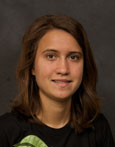
Schep, a chemical biology major, plans to earn a PhD in molecular biology and conduct research in that field then teach at the university level. She is currently doing research in the lab of chemistry Professor Robert Drewell on the transcriptional regulation of the TERT gene in human cells. The TERT gene encodes for the catalytic subunit of Telomerase, which contributes significantly to the ability of stem cells and cancer cells to divide indefinitely. “Understanding the regulation of telomerase is important for understanding how cells become cancerous,” Schep said.
“I am spending a few weeks at Mudd wrapping up my research in the Drewell lab, but I will then be spending most of the summer at NYU doing research in a lab that focuses on post-transcriptional regulation in breast cancer cells,” she said.
The Goldwater Scholars were selected on the basis of academic merit from a field of 1,111 mathematics, science, and engineering students who were nominated by the faculties of colleges and universities nationwide. One hundred fifty-six of the Scholars are men, 122 are women, and virtually all intend to obtain a PhD as their degree objective. Seventeen Scholars are mathematics majors, 199 are science and related majors, 53 are majoring in engineering, and nine are computer science majors. Many of the Scholars have dual majors in a variety of mathematics, science, engineering and computer disciplines.
Karen Morrison ’08 (chemistry), awarded in 2008
Karen Morrison’s original career goal was to conduct cutting-edge research that directly promotes human welfare either in a biotech company or academia.
Since graduating from Harvey Mudd College in Claremont, California, receiving the Goldwater Scholarship in 2008 and earning her PhD in organic chemistry in 2013, Morrison’s career trajectory has veered away from research and landed in the public policy arena where human welfare is still front and center.
“The Goldwater award was the first major external award that I received in my career. At the time, I was confident that I wanted to pursue a research career. In many ways, this was the first step validating and encouraging that path,” Morrison says. “I received an NSF graduate research fellowship the following year and was accepted at every graduate program I applied to; it’s likely that the Goldwater award served as confirmation of my other accomplishments.”
Today, Morrison works in the policy office of the California Department of Resources Recycling and Recovery (CalRecycle). She analyzes data and develops policy related to state waste management.
“I work in an area of environmental policy that is innovative, intellectually demanding and directly promoting human welfare through the safe management of waste in California,” Morrison says. “So while this isn’t the career I set out to have in 2007 when I received the award, the training and development that I’ve received through the research portion of my work is incredibly important, and the Goldwater award was the first recognition of that.”
During her tenure as a California Council on Science and Technology science policy fellow at the California Senate Environmental Quality Committee, Morrison developed a fascination for local politics and can enumerate the quirks of California’s legislative process.
“The politics can be challenging,” she admits,” but I think scientists increasingly recognize we’ve been absent in the political discussion.” Morrison insists the interplay between science and politics needn’t be contentious. She relishes the chance to explore the space in between them and improve the world in the process.
Morrison would like to see more STEM specialists in the political arena.
“Elected officials hold real power in enacting science-based legislation,” she says, “and this is one of the many ways that scientists can get more involved.”
Benjamin David Preskill ’09 (mathematics and physics), awarded in 2008
Preskill, a mathematics/physics major, plans to earn his PhD in applied mathematics and conduct research in computational neuroscience, a field combining physics, mathematics, computer science and neurophysiology. His goal is to teach at the university level. Sokol, who is majoring in chemistry and biology, plans to earn his PhD in molecular biochemistry and pharmacology and conduct research in biochemical science at the university level, primarily as a teaching professor.
The Barry M. Goldwater Scholarship and Excellence in Education Foundation awarded 321 scholarships for the 2008–09 academic year to undergraduate sophomores and juniors from the United States. Goldwater Scholars were selected on the basis of academic merit from a field of 1,035 mathematics, science and engineering students who were nominated by the faculties of colleges and universities nationwide.
One hundred eighty-nine of the scholars are men, 132 are women, and virtually all intend to obtain a PhD as their degree objective. Thirty-three scholars are mathematics majors, 227 are science and related majors, 52 are majoring in engineering and 9 are computer science majors. Many of the scholars have dual majors in a variety of mathematics, science, engineering and computer disciplines.
Ethan S. Sokol ’10 (chemistry and biology), awarded in 2008
The Barry M. Goldwater Scholarship and Excellence in Education Foundation awarded 321 scholarships for the 2008–09 academic year to undergraduate sophomores and juniors from the United States. Goldwater Scholars were selected on the basis of academic merit from a field of 1,035 mathematics, science and engineering students who were nominated by the faculties of colleges and universities nationwide.
One hundred eighty-nine of the scholars are men, 132 are women, and virtually all intend to obtain a PhD as their degree objective. Thirty-three scholars are mathematics majors, 227 are science and related majors, 52 are majoring in engineering and 9 are computer science majors. Many of the scholars have dual majors in a variety of mathematics, science, engineering and computer disciplines.
Brian T. Rice’08 (mathematics), awarded in 2007
Brian Rice, a mathematics major whose career goal is to earn his PhD in pure mathematics, conduct research in discrete mathematics and teach at the university level.
Peter J. Scherpelz ’08 (physics), awarded in 2007
Peter Scherpelz, a physics major whose career goal is to earn his PhD in physics, conduct research in quantum optics or a related field and teach in a university setting.
Gregory T. Minton ’08 (physics), awarded in 2006
Gregory Minton, a physics major , has academic interests that range from algorithms in computer science to representation theory in pure mathematics and he has a special passion for applications of mathematics to theoretical physics.
Matthew Evans ’96 (physics), awarded in 1996
Matthew Evans spent two decades working with colleagues to create a sensor that could detect the illusive gravity waves predicted by Albert Einstein 100 years ago.
On Sept. 15, 2015, detectors at two widely separated LIGO (Laser Interferometer Gravitational-Wave Observatory) sites in Livingston, Louisiana, and Hanford, Washington, simultaneously detected a chirping signal. They had detected gravity waves generated by the collision of two black holes 1.4 billion years ago.
Evans, an assistant professor of physics at Massachusetts Institute of Technology, was thrilled by the incredible news.
“We really didn’t expect to have detected anything. But after I got done with a first pass through the data, by the end of the day I was pretty sure it was real,” Evans says.
Another ripple from two intersecting black holes was recorded by LIGO in December 2015, and more ripples have been recorded since.
Evans has been working for 20 years with the goal of making an interferometer that could detect something. He says gravity waves are important in providing scientists a means of analyzing black holes—which are the remains of long-dead stars—the physical structure of neutron stars and maybe even gravity itself.
He might not have ever been involved with the LIGO project if not for the Barry Goldwater Scholarship and Excellence in Education Program. Evans left his family’s small, rural Oregon farm to attend Harvey Mudd College in Claremont, California.
“For whatever reason, I naively expected that some form of financial aid would materialize when I arrived at Harvey Mudd to help me get by,” Evans said. “The Goldwater award made a huge difference, and it is quite possible that without it, I would not have been able to finish my undergraduate degree.”
After graduating from Harvey Mudd in 1996 with a B.S. in physics, Evans earned his PhD in 2002 from California Institute of Technology, where he began working on the LIGO project.
“The project leveraged my work at Harvey Mudd, but in a different context,” he says. “I wrote LIGO’s first simulation codes, not about the astrophysics but just to make the device work. There’s a lot of physics and technology that goes into the instrument itself.”
As a graduate student and then post-doc, still at Caltech, he travelled between work locations at MIT and the two LIGO sites, creating models and designing parts. He traveled to see how his parts worked on site, then redid his model and created new parts. Before starting as a research scientist at MIT in 2007, he also aided ongoing construction of a third gravitational wave observatory in Italy called Virgo. A fourth site, in Japan, is under construction.
“I spent time doing designs and construction until 2013, trying to better isolate the devices from ground motion as well as create an active, three-layer isolation system with active feedback,” he says.
With the discovery of the first direct detections, Evans says, “We now have a new way to observe black holes, mountains on neutron stars, gravitational blasts from supernovas, remnant waves of the Big Bang …” and more.